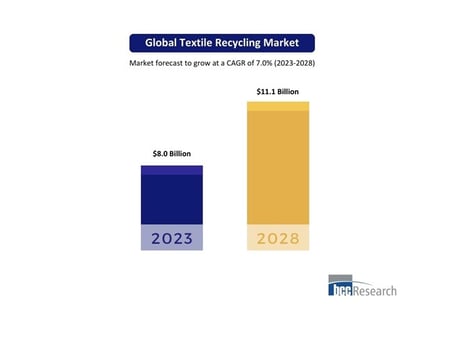
Mar 15, 2024
The textile industry is a major contributor to carbon footprint and waste generation, making it a prime candidate for sustainable and environmentally friendly practices. One such practice is textile recycling, which involves recovering and regenerating fiber from pre-consumer and post-consumer waste textiles. This process has been around since the 18th century and is becoming increasingly important as textile waste continues to accumulate and harm the environment. Governments around the world are implementing strict regulations against textile waste generation. The global textile recycling market is expected to grow from $8.0 billion in 2023 to $11.1 billion by 2028, with a compound annual growth rate of 7.0% during the forecast period of 2023-2028. To reduce environmental pollution and meet the raw material needs of the textile industry, waste textiles are being used to develop new raw material resources. This includes the recovery of nylon fibers, cotton fibers, and polyester.

One of the primary drivers behind the textile recycling market is the growing awareness of environmental issues and the desire for sustainable solutions. Consumers are increasingly concerned about the environmental impact of their purchasing decisions, including the clothing they buy. As a result, there is a rising demand for sustainable fashion and textiles made from recycled materials. The COVID-19 pandemic highlighted vulnerabilities in global supply chains, leading many companies to reevaluate their sourcing and production practices. Textile recycling offers a more resilient and sustainable alternative to traditional manufacturing processes, as it reduces reliance on virgin materials and minimizes supply chain disruptions. While the textile recycling market is global in nature, regional dynamics play a significant role in shaping its growth trajectory. Developed economies, such as North America and Europe, have been early adopters of textile recycling initiatives, driven by strong consumer demand and supportive policies. However, emerging markets in Asia-Pacific and Latin America are also witnessing rapid growth as they seek to address environmental challenges and capitalize on the opportunities presented by sustainable fashion.
The global market for textile recycling is expected to increase from $8.0 billion in 2023 to $11.1 billion by the end of 2028, with a compound annual growth rate (CAGR) of 7.0% during the forecast period of 2023-2028.
The global textile recycling market presents a significant opportunity to promote sustainability, reduce waste, and drive positive change in the fashion industry and beyond. By embracing textile recycling and adopting more eco-friendly practices, we can build a more sustainable future for generations to come. The textile recycling market is experiencing rapid growth as it addresses pressing environmental concerns within the textile industry. With governments, businesses, and consumers increasingly focused on sustainability, textile recycling offers a promising solution to reduce waste and promote resource conservation. Valued at $8.0 billion in 2023 and projected to reach $11.1 billion by 2028, the market's growth underscores its importance in meeting raw material demands while mitigating environmental pollution. Through the recovery of fibers from pre-consumer and post-consumer waste textiles, including nylon, cotton, and polyester, textile recycling is paving the way towards a more sustainable future.
Consider becoming a member of the BCC Research library and gain access to our full catalog of market research reports in your industry. Not seeing what you are looking for? We offer custom solutions too, including our new product line: Custom Intelligence Services.
Contact us today to find out more.

Amrita Kumari is a Senior Executive Email Marketer at BCC Research, with a bachelor’s degree in computer applications. She specializes in content creation and email marketing.

Biophotonics: Technologies and Global Markets (PHO024B)

Global Trade: A Strategic Shift The global trade environment is undergoing a dra...

The global demand for cutting-edge materials continues to rise, and at the foref...

We are your trusted research partner, providing actionable insights and custom consulting across life sciences, advanced materials, and technology. Allow BCC Research to nurture your smartest business decisions today, tomorrow, and beyond.
Contact UsBCC Research provides objective, unbiased measurement and assessment of market opportunities with detailed market research reports. Our experienced industry analysts assess growth opportunities, market sizing, technologies, applications, supply chains and companies with the singular goal of helping you make informed business decisions, free of noise and hype.